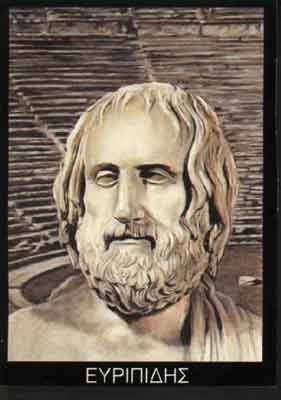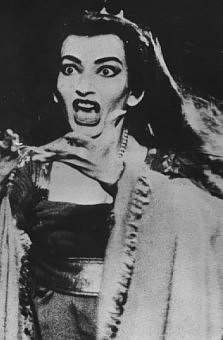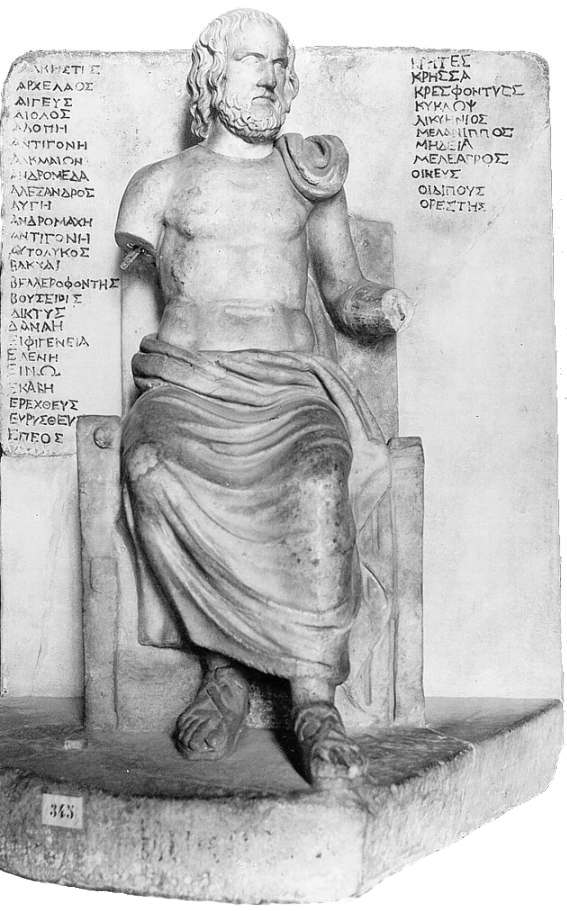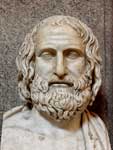.

The last of Athens' great tragic poets is Euripides (Ευριπίδης) ( 486/480, - 406 BC). Legends says that he was born on Salamis the same day of the Salamis battle victory. His mother's name was Cleito, and his father's either Mnesarchus or Mnesarchides. There is a tradition that states Cleito earned an income by selling herbs in the marketplace; Aristophanes found this to be a source of amusement and used it in many comedies. However, there is significant evidence which leads most to believe that Euripides' family was quite comfortable financially, and wouldn't have needed such a source of income. He was a friend of Socrates and to some he spent his time mostly alone outside Athens. According to ancient sources, he wrote over 90 plays, 18 of which are extant (since it is now widely agreed that the play Rhesus was actually written by someone else). Fragments of most of the other plays survive, some of them substantial. The number of Euripides' plays that have survived is more than that of Aeschylus and Sophocles together, partly due to the chance preservation of a manuscript that was likely part of a complete collection of his works. His plays are more exuberant than those of Sophocles and Aeschylus; often, he has the heroes and heroines face difficult choices, which are finally solved by the sudden appearance of a god (deus ex machina). He considers in his plays ordinary people including women and slaves, he showed the reality of war and he criticised religion.

Maria Callas as Medea
Medea is probably his most famous play, and the Trojan Women can be interpreted as a protest against warfare. At the end of his life, he settled in Macedonia, where he wrote The Bacchae, a shockingly strange tragedy, which has been interpreted in many ways. In Iphigenia at Aulis Artemis angry with Agamemnon requires from him to sacrifice his daughter Iphigeneia. Only so she will allow the war of the Greeks with Troy. Iphigeneia assumes that she will marry Achilles and does not know the truth when she comes in Aulis. Agamemnon is in a difficult position he has to sacrifice his daughter as he is expected to do so by the other Greeks in order to calm Artemis but he loves his daughter. What is his decision?
Euripides greatness was recognized by the comic poet Aristophanes, who gives Euripides many appearances in his plays and often parodies scenes from his tragedies. One unreliable tradition holds that he was torn apart by hunting dogs. He died in Macedonia in 406 BC, two years after leaving Athens. During his lifetime he won five prizes the first in 442 BC. His last prize he won with The Bacchae posthumously (finally produced with the help of his son).

Euripides and his Works in Greek, Louvre, See Color Image
See also Relief for the honour of the tragedy writer Euripides shown between the Skene and Dionysus

Euripides, Pio Clementino, Inv 302

|
|
Plays by Euripides
|
|
Cyclops | Alcestis | Medea | Heracleidae | Hippolytus | Andromache | Hecuba | The Suppliants | Electra | Heracles | The Trojan Women | Iphigeneia in Tauris | Ion | Helen | Phoenician Women | Orestes | Bacchae | Iphigeneia at Aulis | Rhesus (spurious)
|
|
MODERN GREEK Translations
- Alcestis
- Andromache
- Iphigeneia at Aulis
- Electra
- Cyclops
- Helen
- Ion
- Medea
- Trojan Women
- Iphigeneia in Taurus
- Rhesus
Links
- Euripides - the Plays Detailed Information about the Plays (The plot, information about the characters... and much more)
- Euripides by Loxias
- Medea by Loxias
- THE HOUSE OF PELOPS: A DYSFUNCTIONAL FAMILY
- Sculpture of Electra and Orestes (Roman c.25-75 AD)
- Poems by Euripides
- Myth fragments: Phoenisses Petros Theodorou, a dance / theatre performance. (MP3 Audio Files of the performance)
- The Discovery of the Euripides Cave
Detail, bronze sheet with figures: Orestes stabbing Clytemnestra while Electra looks on and Aegisthus attempts to flee; Greek, c. 570 BC Olympia Museum. Credits: Barbara McManus, 1980

Euripides in The Apotheosis of Homer, Ingres
Quotations
Oh Zeus! Why have you established in the sunlit world
This counterfeit coin, woman, to curse the human race?
If you desired to plant a mortal stock, why must
The means for this be women? A better plan would be
For men to come to your temples and put down a price
In bronze, or iron, or weight of gold, and buy their sons
In embryo, for a sum befitting each man's wealth.
Then they could live at home like free men - without women
Euripides, Hippolytus
| Ancient Greece
Science, Technology , Medicine , Warfare, , Biographies , Life , Cities/Places/Maps , Arts , Literature , Philosophy ,Olympics, Mythology , History , Images Medieval Greece / Byzantine Empire Science, Technology, Arts, , Warfare , Literature, Biographies, Icons, History Modern Greece Cities, Islands, Regions, Fauna/Flora ,Biographies , History , Warfare, Science/Technology, Literature, Music , Arts , Film/Actors , Sport , Fashion --- |
Retrieved from "http://en.wikipedia.org"
All text is available under the terms of the GNU Free Documentation License

